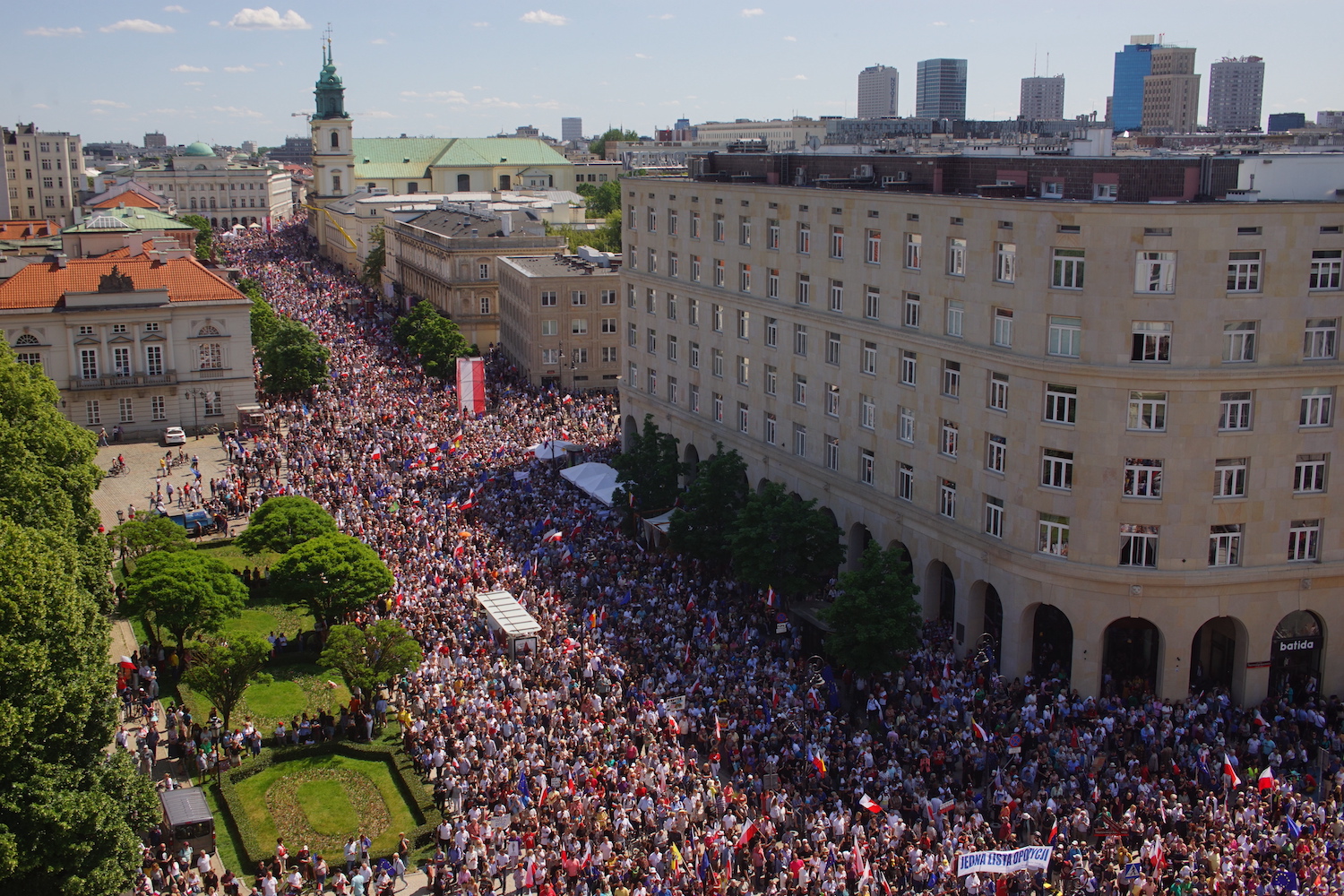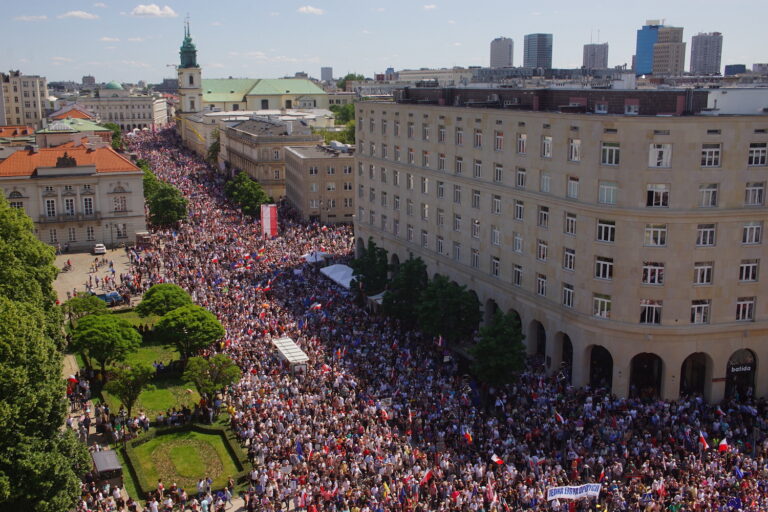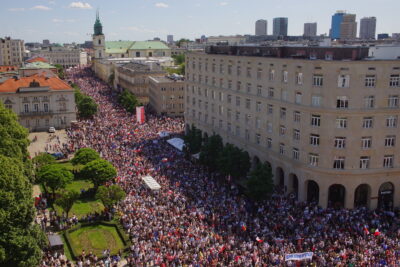Instead of spending their Sunday chilling out, hundreds of thousands of Poles took to the streets of Warsaw this weekend to protest against the Law and Justice (PiS) government. The biggest rally in Poland in many years saw between 300,000 (as estimated by independent media) and 500,000 (as estimated by organizers) participants gather. Despite divisions within the Polish opposition, all democratic parties joined the protest.
Led by Donald Tusk, leader of the Civic Platform, the march took place on the 34th anniversary of the first partly free democratic elections in Poland. While the march’s official message was “against inflation, thievery, and lies, for free elections and a democratic, European Poland,” many protesters were especially triggered by the latest anti-constitutional laws introduced by the government.
The so-called “lex Tusk” or “Russian influence law” prompted fierce criticism and consternation at home and abroad that Polish democracy is backsliding further.
On May 26, the Polish parliament voted for a bill establishing a special state commission “for investigating Russian influence on the internal security of the Republic of Poland in 2007-2022.”
The soon-to-be-established commission will have the power to arbitrarily label almost anyone a “Russian influence agent” and exclude such a person from public activity.
The nine-member body will act as a prosecutor and judge all in one. Moreover, the bill explicitly guarantees that it will have impunity for its decisions.
Some of the most controversial provisions said that if the commission determined someone acted under Russian influence, it could revoke a security clearance or impose a ban on performing functions related to the disposal of public funds for up to 10 years.
In addition, the commission will gain full access to classified documents and company secrets from any related investigation—regardless of whether that investigation was carried out by the prosecutor’s office or intelligence/counterintelligence agencies. One can easily imagine a flood of controlled leaks into the propaganda media, effectively operating as smear campaigns, particularly as Poland heads into elections this fall.
The commission will not limit itself to searching for proof of Russian influence on former government officials. It also aims to investigate Russian influence on the activities of persons “influencing the mass media,” “spreading false information,” and activities of associations or foundations.
Renowned Polish law experts and constitutionalists, including professors Ryszard Piotrowski, Adam Strzembosz, and Andrzej Rzepliński, among others, pointed out a long list of constitutional abuses and called the new commission a “grand inquisition” and “witch hunt.”
The US State Department issued a statement sharing concerns that “new legislation could be misused to interfere with Poland’s free and fair elections.”
“We share the concerns expressed by many observers that this law to create a commission to investigate Russian influence could be used to block the candidacy of opposition politicians without due process,” said the statement.
After receiving such a strong message from his American ally, Polish President Andrzej Duda, who had already signed the bill, introduced a draft amendment that allows an appeal procedure and removes the most drastic penalties, such as banning from holding public office for 10 years. However, the provisions proposed by Duda do not change the essence of new regulations and still need to go through the parliament—the same parliament that is already proceeding with another draft bill on espionage, redefining spy activities and imposing higher penalties, including a lifetime sentence. The new catalog of spy activities includes disinformation and unintentional espionage.
Meanwhile, the commission investigating Russian influence can start its work immediately. Law and Justice seems to be in a hurry, as the commission’s first report is already scheduled for September 17th, which marks the anniversary of the Soviet invasion of Poland in 1939. This date might be important for a different reason, too, as less than a month afterward, Poles will vote in parliamentary elections (the official date has yet to be confirmed, according to media reports, the most probable date is October 15th).
Law and Justice politicians have been concerned about losing the elections for months. They have no doubt: if the opposition wins, they might not only lose power and money, but will also be held accountable by the new parliamentary majority, government, and law enforcement. A few months ago, one of the prominent politicians of the ruling coalition acknowledged in an unofficial conversation: “If they win, they will put us into jail.”
The determination of the ruling coalition to stay in power is proportionate to the stakes of the elections. Politics in Poland is entering the darkest and dirtiest time in decades.
This moment in Polish politics is going to be defined by the “Russian influence” narrative and the “Russian agent” label.
State and propaganda media are already moving fullsteam ahead with the labels. On the day of the opposition rally, TVP (Polish state-controlled television) news channel posted a chyron saying “OPPOSITION UNITED IN DEFENSE OF RUSSIA.”
Following the same narrative, propaganda weekly WSieci went with a cover that asked, “Where Tusk’s fear comes from,” to which it itself quickly responded, “It’s about what the Poles themselves will see, hear, and from which they will draw their own conclusions. About recalling the numerous decisions in favor of Russia made by Tusk and his close circle, about the careless acquiescence in strengthening the neo-imperialist superpower. Or perhaps about where the idea of a reset in Polish-Russian relations came from and, above all, about Germany’s role in getting Warsaw to change its position even at the cost of jeopardizing Poland’s security.”
While one might find it confusing that such a cover is coming from the weekly that published a long interview with the Russian ambassador just after Russia invaded Ukraine, propaganda campaigns, however intellectually inconsistent, have long proved to be a powerful tool for populists and autocrats whose power started shrinking.
Ironically, amid all this Polish political turmoil over false Russian influence, real Russian influence may easily go unnoticed.
As almost anyone will soon be able to be labeled an agent of Russian influence, exposing the real ones might not have any impact. Busy with chasing Tusk and the opposition, Polish intelligence has been struggling with taking action against far-right politicians like Grzegorz Braun and his aides, or against far-right activists and social media influencers spreading pro-Russian narratives and anti-Ukrainian propaganda, which we have investigated and covered in many reports over the last years, both on VSquare and FRONTSTORY.
There is also the ongoing threat of Russia’s election interference as related to the “Ghostwriter” cyber espionage operation, which we first revealed in 2021. As we reported, apart from the so-called Dworczyk leak, the cyber attackers obtained a vast amount of sensitive data from the Polish VIPs’ emails that still hasn’t been used. Despite a months-long prosecutor’s office investigation, little is known about the scale of the threat, and little progress has been made uncovering those behind the operation.
By playing their “whack-a-Russian mole” game, the ruling party might ultimately squander Poland’s role in helping Ukraine. Since Russia’s invasion of Ukraine, Central Europe generally and Poland especially has found itself at the frontline of the global response to Russia’s war in Ukraine. Leading the regional response to the war, Warsaw has become a central spot of geopolitical events. The Poles, as well as Lithuanians, Estonians, Czechs, and Slovaks, have been at the forefront of EU efforts to provide Ukraine with political assistance, military support, and humanitarian aid.
All of that can easily be overshadowed by the domestic electoral battle. Playing with false Russian fire when the real Russian bombs burn Ukrainian cities isn’t the product of Russian influence, but it does play right into Putin’s hands.
Cover photo: Crowd at march in defense of democracy, Poland, Warsaw June 4, 2023. Source: Michal Mitoraj / Forum
Anna Gielewska is co-founder and editor-in-chief of VSquare and co-founder of Polish investigative outlet FRONTSTORY.PL. She is also vice-chairwoman of Fundacja Reporterów (Reporters Foundation). A journalist specializing in investigating organized disinformation and propaganda, Gielewska was the John S. Knight Fellow at Stanford University (2019/20) and has been shortlisted for the Grand Press Award (2015, 2021, 2022) and the Daphne Caruana Galizia Award (2021, 2023). She was the recipient of the Novinarska Cena in 2022.







